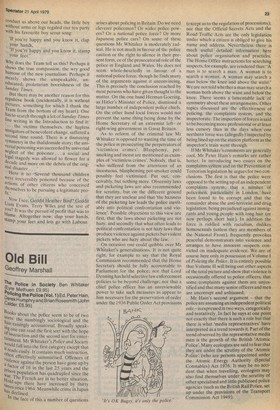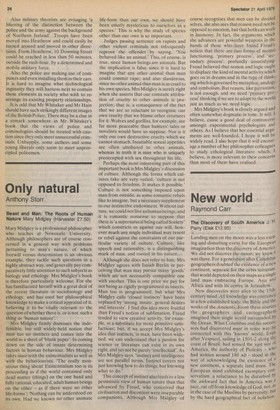Old Bill
Geoffrey Marshall
The Police in Society Ben Whitaker (tyre Methuen £9.95) IlcingthePolice(Vol.1) Ed. Peter Hain, uerek Humphry and Brian Rosesmith (John Calder £6.95) 800ks about the police seem to be of two snrts: the numbingly sociological and the llair-raisingly accusatorial. Broadly speaking one can read the first sort with the hope (*instruction and the second sort for entertainment. Mr Whitaker's Police and Society would fall into the first category except that It reads easily. It contains much instruction, ciften effectively summarised. Offences of violence against the person have gone up by a factor of 16 in the last 25 years and the Prison population has quadrupled since the v,ar• The French are in no better situation. 701d-up5 there have increased by thirty times since 1964. Meanwhile crime in Japan as declined. In the face of this a number of questions arises about policing in Britain. Do we need cleverer policemen? Or wider police powers? Or a national police force? Or more Japanese police cars? On some of these questions Mr Whitaker is moderately radical. He is not much in favour of the police caution or the right to silence in their present form, or of the prosecutorial role of the police in England and Wales. He does not seem whole-heartedly in favour of a national police force, though he finds many of the arguments against it unconvincing. This is precisely the conclusion reached by most persons who have given thought to the matter. On the one hand Herman Goering, as Hitler's Minister of Police, dismissed a large number of independent police chiefs. On the other hand local forces would not prevent the same thing being done by the Home Secretary of an extremist leftor right-wing government in Great Britain.
As to reform of the criminal law Mr Whitaker is opposed to wasting the time of the police in prosecuting the perpetrators of 'victimless crimes'. Blasphemy, potsmoking and incest are mentioned as examples of 'victimless crimes'. Nobody. that is. who suffered from the attentions of an incestuous, blaspheming pot-smoker could possibly feel victimised. Put out, conceivably. but nothing more. Obscenity laws and picketing laws are also recommended for scrutiny, but on the different ground that they are unclear and that 'the haziness of the picketing law leads the police inevitably into political confrontation and violence'. Possible objections to this view are first, that the laws about picketing are not hazy. and secondly that what often leads to political confrontation is not hazy laws that produce violence against pickets but violent pickets who are hazy about the law.
On occasion one could quibble over Mr Whitaker's generalisations. It is not quite right, for example to say that the Royal Commission recommended that the Home Secretary should be fully accountable to Parliament for the police; nor that Lord Denning has held selective law enforcement policies to be beyond challenge; nor that a chief police officer has an unreviewable power to take such measures as appear to him necessary for the preservation of order under the 1936 Public Order Act provisions (except as to the regulation of processions); nor that the Official Secrets Acts and the Road Traffic Acts are the only legislation under which a citizen is obliged to give his name and address. Nevertheless there is much useful detailed information hcre about police organisation and practiees. The Home Office instructions for searching suspects, for example, are rendered thus: 'A man is to search a man. A woman is to search a woman. A woman may search a man below the knee and above the waist.' We are not told whether a man may search a woman both above the waist and below the knee. There seems a lamentable lack of symmetry about these arrangements. Other topics discussed are the effectiveness of policing, the complaints system, and the inspectorate. The inspection of forces is said to be becoming more professional or at least less cursory than in the days when one northern force was (allegedly) inspected by being lined up on the station platform as the inspector's train went through.
If Mr Whitaker's comments are generally cool, Mr Peter Hain's remarks are rather hotter. In introducing two essays on the complaints system and on the Prevention of Terrorism legislation he argues for two conclusions. The first is that the police were opposed to the setting up of an independent complaints system; that a number of policemen, particularly in London, have been found to be corrupt and that the remainder abuse the anti-terrorist and drug legislation. being prejudiced against immigrants and young people with long hair (or now perhaps short hair). In addition the force is riddled with racialism, dislikes homosexuals (unless they are members of the National Front). frequently provokes peaceful' demonstrators into violence and arranges to have innocent suspects convicted on inadequate evidence. We are of course here only in possession of Volume I of Policing the Police. It is entirely possible that Volume II will bring out other aspects of the total picture and show that violence is occasionally offered to police officers, that some complaints against them are unjustified and that many senior officers and men are uncorrupt and unbiassed.
Mr Hain's second argument — that the police are assuming an independent political role — is expressed in two ways, categorically and tentatively. In fact he says at one point not exactly that there is such a role but that there is what 'media representatives' have interpreted as a trend towards it. Part of the trend observed by the representative media men is the growth of the British 'Atomic Police'. Many ecologists are said to fear that they are under the scrutiny of the 'Atomic Police' (who are persons appointed under the Atomic Energy Authority (Special Constables) Act 1976. It may be no accident that when travelling, ecologists may also find themselves under the scrutiny of other specialised and little publicised police agencies (such as the British Rail Police, set up under the provisions of the Transport Commission Act 1949). Also military theorists are evisaging 'a blurring of the distinction between the police and the army against the background of Northern Ireland'. Troops have been moved into Heathrow and could easily be turned around and moved in other directions. From Heathrow. 10 Downing Street could be reached in less than 50 minutes, outside the rush-hour, by a determined and mobile military force.
Also the police are making use of computers and even installing them in their cars. It is hard to imagine what technological ingenuity they will harness next to contain those elements in society who wish to rearrange its existing property relationships.
It is odd that Mr Whitaker and Mr Hain should have such strikingly different images of the British Police. There may be a clue in a remark somewhere in Mr Whitaker's book that the views of police and criminologists should be treated with caution since they only meet unsuccessful criminals. Unhappily, some authors and some young liberals only seem to meet unprincipled policemen.







































 Previous page
Previous page